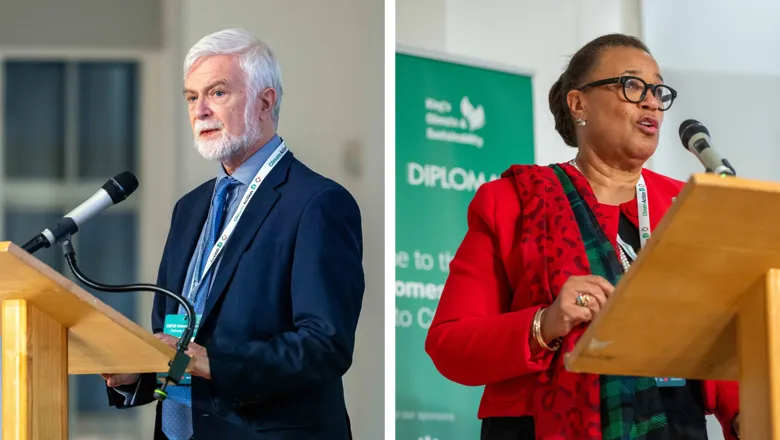Most countries and stakeholders would have wished for more ambitious outcomes [at COP29]. I understand their aspirations and share their frustrations. Nevertheless, we should acknowledge that the new finance goal will significantly enhance funding for climate action in developing countries. Much more needs to be done.
Patricia Espinosa, Former Executive Secretary of the United Nations Framework Convention on Climate Change
05 December 2024
King's convenes global climate leaders to reflect on COP29
Experts and political leaders discussed the negotiations in Azerbaijan and looked ahead to COP30 in Brazil

Hosted by King’s Climate & Sustainability, the Policy Institute at King's, the Climate Action Coalition and Diplomat magazine, the COP29 Outcomes Forum convened ambassadors, high commissioners, business leaders, academics and civil society representatives to unpick what was achieved at the COP29, explore how it can be delivered and look ahead to ambitions for COP30.
The Forum – which was supported by London Stock Exchange Group and Climate Impact Partners – was opened by Professor Shitij Kapur, President and Vice-Chancellor at King’s, and The Rt Hon Chris Skidmore OBE, Chair of the Climate Action Coalition and the Independent Review of Net Zero.
An opening keynote was given by Professor Jim Skea, Chair of the Intergovernmental Panel on Climate Change, who outlined the challenges of the global community in reaching the 1.5 degrees warming limit as set out in the 2015 Paris Climate Agreement.
The second keynote was delivered by Patricia Espinosa, Former Executive Secretary of the United Nations Framework Convention on Climate Change, who acknowledged the successes of the finance goal agreed on at COP, whilst reflecting on its limits and the need for further action.
The third keynote was provided by The Rt Hon Patricia Scotland KC, 6th Commonwealth Secretary General. Introduced by Professor Rachel Mills, Senior Vice President (Academic) at King’s, Baroness Scotland described how the Commonwealth is a powerful force in the battle against the climate crisis and for supporting small and vulnerable countries.
A range of other speakers contributed to panel discussions on the progress made at COP29, including on the global stocktake, loss and damage and climate finance, and on what the future aims should be for international climate policy.
Three King’s academics took part in the panel discussions: Professor Frans Berkhout, Assistant Principal (Climate & Sustainability), Professor David Aikman, Professor of Finance and Director of the Qatar Centre for Global Banking and Finance, and Professor Sarah Bracking, Professor of Climate and Society.
The scale and pace of climate change poses unprecedented challenges for humanity, but our recent work has shown that we have the means and the tools to address the challenges, if we choose to use them.
Professor Jim Skea, Chair of the Intergovernmental Panel on Climate Change
Other speakers included H.E. Elen Suleymanov, Ambassador of Azerbaijan to the UK; Kerstin Mathias, Corporation of The City of London; Emilien Gasc, EU Delegation to the UK; H.E. Antonio Patriota, Ambassador of Brazil to the UK; David Harris, London Stock Exchange Group; and Rachel Brisley, Head of Energy and Environment, Ipsos UK.
The climate process, however imperfect, remains our greatest hope for collective action. This is not the time for cynicism, it’s the time for courage. Courage to act decisively, courage to lead boldly, courage to believe that we can do it.
The Rt Hon Patricia Scotland KC, 6th Commonwealth Secretary General
The event underscores King’s commitment to using the convening power of the University – and its location at the heart of a global city – to work with governments and policymakers around the world in delivering strong contributions to the challenge of climate change and transitions to sustainability.
I think the biggest impact that we as a university can have is on the 18,000 young people who walk out of our doors every year. And while we will contribute in so many other ways, I think the biggest contribution that we can make is to give a scholarly discussion and engagement with the issues of climate, as an important and necessary part of almost everything we teach.
Professor Shitij Kapur, President and Vice-Chancellor at King’s
At King's we are rapidly scaling our response to the climate emergency through transformative multidisciplinary research and by embedding sustainability into our teaching, partnerships, and operations. Our major initiatives such as the Net Zero Centre and Centre for Sustainable Business are bringing together expertise from within and outside of the University to generate insights that influence climate action and enable just and fair transitions to net zero.
